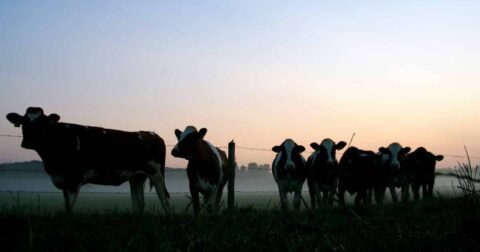Explainer
How Livestock Farming Affects Climate Change, Explained
Climate•7 min read
Explainer
Animal agriculture generates massive amounts of greenhouse gases, despite the industry's recent efforts to clean up its act.


Words by Sentient Media
As the climate crisis intensifies and extreme weather events become more frequent, our society needs to take real action to address climate breakdown and ecological collapse while advancing social and environmental justice.
Changing our food system is one such critical step, particularly industrial animal agriculture which generates a substantial portion of global GHG emissions and uses over 80 percent of all farmland while providing only 18 percent of food calories.
Take a closer look at how animal agriculture impacts the environment.
Today, vital ecosystems are being cleared for animal agriculture. This land-use change accelerates biodiversity loss which exacerbates food insecurity worldwide and decreases the environment’s natural ability to sequester carbon.
Changing the way we produce and consume food can meaningfully address all these issues. Switching to a plant-based diet will significantly reduce our carbon footprint. Our leaders can assist this transition by divesting from industrial animal farming corporations. Governments currently extend massive financial support to animal farming with global farm subsidies valued at $540 billion each year. These funds further concentrate the factory farming industry.
With no restrictions on polluting practices and toxic inputs, factory farms are able to maximize profits and expand their operations. These operations are detrimental to the health of the farmed animals and the wellness of workers and communities.
Factory farms pollute the soil, air, and water. Meat corporations have attempted to hide these harms behind ineffective solutions that distract from the enormous impacts of animal agriculture.
In order to maintain a healthy environment for all life on this planet and feed the growing human population, the future of food must become more sustainable.
We must invest in new forms of agriculture that protect and restore the environment. Many animal farmers are already transitioning to sustainable agriculture. We can accelerate this transition by picking what we put on our plates and telling our elected officials that transitioning to a plant-based food system is necessary for climate resilience.